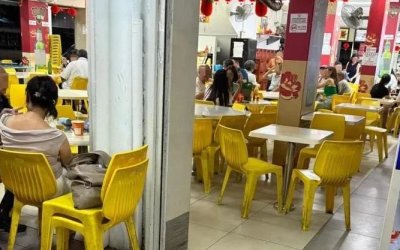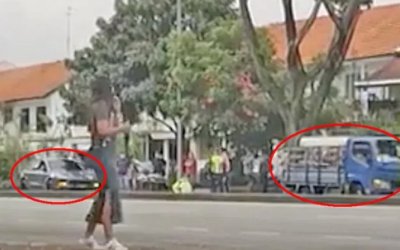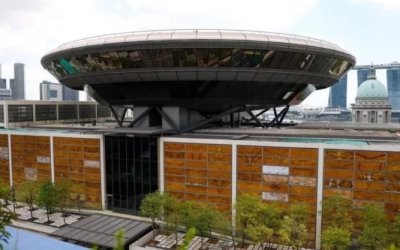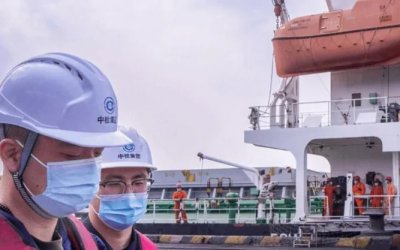副議長先生,新加坡的連通性是我們最大的資產之一,我們必須繼續小心維護,以保護新加坡和新加坡人的利益。我們將以審慎和有針對性的方式,在對我們的運輸業有用和實際可行,以及儘量減少對公司和投資者的商業和成本影響之間取得平衡。我們會繼續與業界及有關人士緊密合作,以實施這基法案。議長先生。我謹提出以上動議。

以下是英文質詢內容:
TRANSPORT SECTOR (CRITICAL FIRMS) BILL(1)
Order for Second Reading read.
The Minister for Transport (Mr Chee Hong Tat): Mr Speaker, I beg to move, 「That the Bill be now read a Second time」.
Connectivity is essential to Singapore and our economy. Many Singaporeans rely on public transport for our daily activities. In 2023, we had over seven million daily rides on our public buses and trains, serving millions of commuters across the country. We also rely on our air and sea connectivity to bring in essential goods, support the growth of our industries and connect Singaporeans with the rest of the world.
Last year, Changi Airport served about 59 million passengers. We are now connected to about 420 cities through almost 120 airlines. As one of the busiest ports in the world, our maritime hub is a key node in global supply chains. Our port is linked to 600 ports around the world and in 2023, our container throughput reached a new high of 39 million, 20-foot equivalent units.
Our connectivity to the world is critical not just during peacetime. During the COVID-19 pandemic, it was our strong connectivity to the region and beyond that allowed Singapore to receive and send out critical supplies, including food and medical essentials. Within Singapore, we worked hard to maintain connectivity by keeping our public transport services running, so that our essential workers could continue to go to work to fight the crisis and keep the country going.
All these benefits cannot be achieved without the safe and reliable provision of essential air, land and sea transport services at all times and under all circumstances, including during a crisis. Sir, the proposed Bill today therefore aims to put in place measures to enhance the resilience of essential transport services in Singapore and set the foundations to protect Singapore against possible future disruptions to our essential transport firms. Our objective is to help Singapore prepare for possible extreme scenarios that may happen in future, so that we are ready for these risks.
For example, we cannot rule out the risk of malicious actors gaining control and adversely influencing our key transport entities, jeopardising the provision of essential transport services in Singapore. We have built strong relationships with the firms in our transport ecosystem and worked closely with them during peace time and crises, such as the COVID-19 pandemic, to provide safe, reliable and efficient services for Singapore, and we want to make sure that they continue to do so in the years ahead.
We are not alone in making moves to safeguard our essential transport services. Other countries have taken steps to protect their strategic assets too. In 2021, the United Kingdom (UK) passed the National Security and Investments Act, which allows the government to intervene in certain acquisitions made that could harm the UK's national security. In the United States (US), the Foreign Investment Risk Review Modernisation Act was passed in 2018 to expand the jurisdiction of the Committee on Foreign Investment in the US, to address growing national security concerns over foreign investment in US companies or operations.
[Deputy Speaker (Mr Christopher de Souza) in the Chair]
Singapore already has regulations in place to safeguard some of our essential sectors. For example, the Banking, and Telecommunications Acts require approval to be sought before a person acquires a certain percentage of shares or voting power in a licensee; and prior to the appointment of key personnel, such as the chief executive officer (CEO). The Electricity, and Public Utilities Acts also provide similar levers to safeguard the management and provision of electricity and water in Singapore, to ensure that these supplies always remain available.
More recently, the Ministry of Trade and Industry passed the Significant Investments Review Act, or SIRA, which provides the Government with an updated set of regulatory levers to manage threats posed by significant investments into critical entities. Likewise, the Ministry of Transport (MOT) would like to propose measures to ensure that our essential transport systems are able to serve Singapore and Singaporeans effectively, now and in the future.
Mr Deputy Speaker, please allow me to explain why we are introducing a transport sector-specific regulatory framework through this Bill, which is consistent across the air, land and sea transport sectors, instead of going through a broad-based legislation like SIRA. A sector-specific approach can better allow us to customise the regulatory oversight needed for Singapore's transport ecosystem and balance these objectives with the commercial and business impact on our transport entities and their investors.
We have, therefore, designed our regulations in a calibrated and targeted manner. The proposed Bill does not seek to regulate the standards and performance of our entities' day-to-day operations. Rather, it seeks to protect key transport entities against the risk of malicious actors exerting undue influence over these entities and ensure that commercial decisions made by the entities do not jeopardise their ability to provide essential transport services in Singapore.
Some entities may be involved in the provision of other services outside of transport, such as food and beverage (F&B) or advertising services. The Bill will not focus on regulating these services; instead, it is targeted at the parts of the entity that directly provide essential transport services in Singapore.
In addition, we also recognise that different entities play different roles to deliver a range of services. Since last year, MOT has been engaging the key transport entities to better understand how regulations can be practically implemented. We have taken in their feedback when designing this Bill and we are mindful of the commercial impact. MOT will, therefore, differentiate some controls based on entities' roles, responsibilities and functions, which I will elaborate in a later part of my speech.























